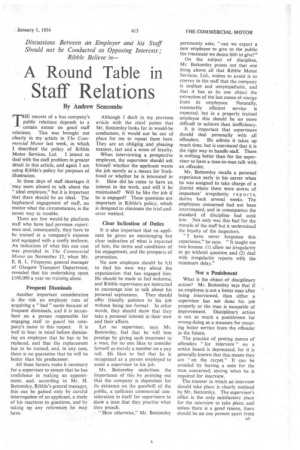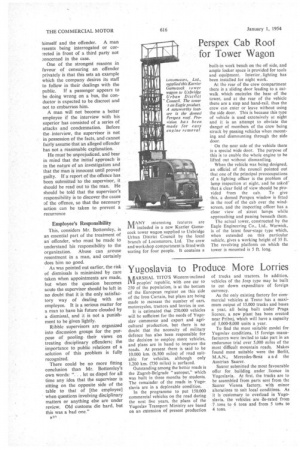Discussions Between an Employer and his Staff Should not be Conducted as Opposing Interests ; Ribble Believe in—
Page 43

Page 44

If you've noticed an error in this article please click here to report it so we can fix it.
• A Round Table in
Staff Relations
By Andrew Seacombe
THE success of a bus company's public relations depends to a certain extent on good staff relations. This was brought out clearly in my article in The Commercial Motor last week, in which I described the policy of Ribble Motor Services, Ltd. I intend to deal with the staff problem in greater detail in this article, and again I am using Ribble's policy for purposes of illustration.
In these days of staff shortages it 'may seem absurd to talk about the "ideal employee," but it is important that there should be an ideal. The haphazard engagement of staff, no matter what the circumstances, is the surest way to trouble.
There are few would-be platform staff who have had previous experience and, consequently, they have to be trained at a company's expense and equipped with a costly uniform. An indication of what this can cost was provided in 7'he, Commercial Motor on November 13, when Mr. E. R. L. Fitzpayne, general manager of Glasgow Transport Department, revealed that his undertaking spent £100,000 a year on training alone.
Frequent Dismissals Another important consideration is the risk an employer runs of acquiring a " bad " name because of frequent dismissals, and it is incumbent on a person responsible for engaging staff to guard his com pany's name in this respect. It is well to bear in mind before dismissing an employee that he has to be replaced, and that the replacement has to be trained, and, in any case, there is no guarantee that he wilt be better than his predecessor.
All these factors make it necessary for a supervisor to ensure that he has confidence in making an appointment, and, according to Mr. H. Bottomley, Ribble's general manager, this can be gained only by careful interrogation of an applicant, a study of his reactions to questions, and by taking up any referenceshe may have. Although I dealt in my previous article with the chief points that Mr. Bottomley looks for in would-be conductors, it would not be out of place for me to repeat them here. They are an obliging and pleasing manner, tact and a sense of loyalty.
When interviewing a prospective employee, the supervisor should ask himself whether the applicant wants the job merely as a means for livelihood or whether he is interested in it. How did he come to have an interest in the work, and will it be maintained? Will he like the job if he is engaged? These questions are important in Ribble's policy, which is designed to eliminate the trial-anderror method.
Clear ludication of Duties It is also important that an applicant be given an encouraging but clear indication of what is expected of him, the terms and conditions of his engagement, and the prospects of promotion.
No new employee should be kft to find his own way about the organization that has engaged him. He should be made to feel welcome, and Ribble supervisors are instructed to encourage him to talk about his personal aspirations. They should offer friendly pointers to his job without being too formal. In other words, they should show that they take a personal interest in their men and their affairs.
Let no supervisor, says Mr. Bottomley, feel that he will lose prestige by giving such treatment to a man, for no one likes to consider himself as merely a number on a pay roll. He likes to feel that he is recognized as a person employed to assist a supervisor in his job.
Mr. Bottomley underlines the importance of this by pointing out that the company is dependent for its existence on the goodwill of the public, a sufficient commercial consideration in itself for supervisors to show a man that they practise what they preach.
" How otherwise," Mr. Bottomley pertinently asks, "can we expect a new employee to give to the public the treatment we desire filth' to gfve?"
On the subject of discipline, Mr. Bottomley points out that one thing above all that Ribble Motor Services, Ltd., wishes to avoid is to convey to the staff that the company is soulless and unsympathetic, and that it has as its one object the extraction of the last ounce of energy from its employees. Naturally, reasonably efficient service is expected, but in a properly trained employee this should be no more difficult to achieve than inefficiency.
It is important that supervisors should deal personally with all offenders. He admits it takes up much time, but is convinced that it is the right way to handle staff. There is nothing better than for the supervisor to have a man-to-man talk with an offender.
Mr. Bottomley recalls a personal experience early in his career when he was assigned to take charge of a district where there were scores of inspectors' irregularity repor t s, dating back several weeks. The employees concerned had not been interrogated, and in consequence the standard of discipline had sunk low. Not only was this bad for the morale of the staff but it undermined the loyalty of the inspectors.
"I have never forgotten this experience," he says. "It taught me two lessons: (1) allow no irregularity to go without question and (2) deal with irregularity reports with the minimum delay."
Not a Punishment What is the object of disciplinary action? Mr. Bottomley says that if an employee is .not a better man after being interviewed, then either a supervisor has not done his job properly or the man is incapable of improvement. Disciplinary action is not so much a punishment for wrong-doing as a measure for ensuring better service from the offender in the future.
The practice of posting names of offenders "for interview" on a notice board is deprecated, for it is generally known that this means they are "on the carpet." It can be avoided by leaving a note for the man concerned, stating when he is required for interview.
The manner in which an interview should take place is clearly outlined by Mr. Bottomley. The supervisor's office is the only satisfactory place for the interview to take place, and unless there is a good reason, there should be no one present apart from himself and the offender. A man resents being interrogated or corrected in front of a third party not ;:oncerned in the case.
One of the strongest reasons in favour of censuring an offender privately is that this sets an example which the company desires its staff to follow in their dealings with the public. If a passenger appears to be doing wrong on a bus, the conductor is expected to be discreet and not to embarrass him.
A man will not become a better employee if the interview with his superior has consisted of a series of attacks and condemnation. Before the interview, the supervisor is not in possession of the facts, and cannot fairly assume that an alleged offender has not a reasonable explanation.
He must be unprejudiced, and bear in mind that the initiar approach is in the nature of an investigation and that the man is innocent until proved guilty. If a report of the offence has been submitted to the supervisor, it should be read out to the man. He should be told that the supervisor's responsibility is to discover the cause of the offence, so that the necessary action can be taken to prevent a recurrence
Employee's Responsibility
This, considers Mr. Bottomley, is an essential part of the treatment of an offender, who must be made to understand his responsibility to the organization. Abuse can arouse resentment in a man, and certainly does him no good.
As was pointed out earlier, the risk of dismissals is minimized by care taken when appointments are made, but when the question becomes acute the supervisor should be left in no doubt that it is the only satisfactory way of dealing with an employee. It is a serious matter for a man to have his future clouded by a dismissal, and it is not a punishment to be given lightly.
Ribble supervisors are organized into discussion groups for the purpose of pooling their views on treating disciplinary offenders; the importance to public relations of a solution of this problem is fully recognized.
There could be no more fitting conclusion than Mr. Bottomley's own words: ". . . let us dispel for all time any idea that the supervisor is sitting on the opposite side of the table to that of [the employee] when questions involving disciplinary matters or anything else are under review. Old customs die hard, but this was a had one."




























































































